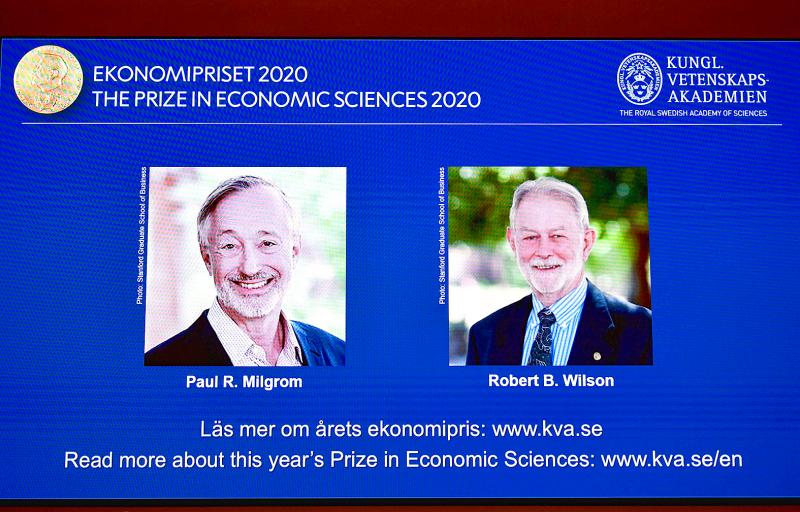Two US economists yesterday won the Nobel Prize for improving the theory of how auctions work, and inventing new and better auction formats that are now woven into many parts of the economy.
The discoveries of Paul Milgrom and Robert Wilson “have benefited sellers, buyers and taxpayers around the world,” the Nobel Committee said, adding that the auction formats developed by the winners have been used to sell radio frequencies, fishing quotas and airport landing slots.
Both are based at Stanford University in California, and Milgrom said he received news of their win “in a strange way.”

Photo: AFP
“I got a knock at my door from Bob Wilson,” he said. “He was my PhD adviser, and he lives right across the street from me.”
Milgrom said students, friends and colleagues had long suggested he and Wilson might be due for the prize.
“It’s really sweet actually,” he said. “It’s nice to have their respect, but their affection as well.”
The winners were announced in Stockholm by Royal Swedish Academy of Sciences secretary-general Goran Hansson, rounding off a week of Nobel prizes.
Technically known as the Sveriges Riksbank Prize in Economic Sciences in Memory of Alfred Nobel, the award was established in 1969 and is now widely considered one of the Nobel prizes.
The committee said Wilson’s work showed “why rational bidders tend to place bids below their own best estimate of the common value,” that is, “the value which is uncertain beforehand but, in the end, is the same for everyone.”
“[Bidders] are worried about the winner’s curse — that is, about paying too much and losing out,” the committee said.
Wilson, 83, described his former student as “sort of the genius behind all of this auction work,” adding that they first worked together on auctions in the 1970s.
“We’re really motivated to use theory in a very practical way to improve various economic processes,” Wilson said.
Milgrom, 72, developed a more general theory of auctions that takes into account what is known as the “private value” of what is being sold that can vary greatly from bidder to bidder.
Speaking to reporters in Stockholm by phone after learning of his win, Wilson struggled to think of an auction he had participated in, but then added: “My wife points out to me that we bought ski boots on eBay. I guess that was an auction.”
Last year’s award went to two researchers from the Massachusetts Institute of Technology and a third from Harvard University, for their groundbreaking research into efforts to reduce global poverty.

WAITING GAME: The US has so far only offered a ‘best rate tariff,’ which officials assume is about 15 percent, the same as Japan, a person familiar with the matter said Taiwan and the US have completed “technical consultations” regarding tariffs and a finalized rate is expected to be released soon, Executive Yuan spokeswoman Michelle Lee (李慧芝) told a news conference yesterday, as a 90-day pause on US President Donald Trump’s “reciprocal” tariffs is set to expire today. The two countries have reached a “certain degree of consensus” on issues such as tariffs, nontariff trade barriers, trade facilitation, supply chain resilience and economic security, Lee said. They also discussed opportunities for cooperation, investment and procurement, she said. A joint statement is still being negotiated and would be released once the US government has made

NEW GEAR: On top of the new Tien Kung IV air defense missiles, the military is expected to place orders for a new combat vehicle next year for delivery in 2028 Mass production of Tien Kung IV (Sky Bow IV) missiles is expected to start next year, with plans to order 122 pods, the Ministry of National Defense’s (MND) latest list of regulated military material showed. The document said that the armed forces would obtain 46 pods of the air defense missiles next year and 76 pods the year after that. The Tien Kung IV is designed to intercept cruise missiles and ballistic missiles to an altitude of 70km, compared with the 60km maximum altitude achieved by the Missile Segment Enhancement variant of PAC-3 systems. A defense source said yesterday that the number of

‘CRUDE’: The potential countermeasure is in response to South Africa renaming Taiwan’s representative offices and the insistence that it move out of Pretoria Taiwan is considering banning exports of semiconductors to South Africa after the latter unilaterally downgraded and changed the names of Taiwan’s two representative offices, the Ministry of Foreign Affairs (MOFA) said yesterday. On Monday last week, the South African Department of International Relations and Cooperation unilaterally released a statement saying that, as of April 1, the Taipei Liaison Offices in Pretoria and Cape Town had been renamed the “Taipei Commercial Office in Johannesburg” and the “Taipei Commercial Office in Cape Town.” Citing UN General Assembly Resolution 2758, it said that South Africa “recognizes the People’s Republic of China (PRC) as the sole

Taiwanese exports to the US are to be subject to a 20 percent tariff starting on Thursday next week, according to an executive order signed by US President Donald Trump yesterday. The 20 percent levy was the same as the tariffs imposed on Vietnam, Sri Lanka and Bangladesh by Trump. It was higher than the tariffs imposed on Japan, South Korea and the EU (15 percent), as well as those on the Philippines (19 percent). A Taiwan official with knowledge of the matter said it is a "phased" tariff rate, and negotiations would continue. "Once negotiations conclude, Taiwan will obtain a better